Tim Atkinson's Blog, page 31
November 1, 2016
Heartbreaking
I drove to work yesterday morning, a journey of some fifteen miles, unremarkable except perhaps for the fog - quite thick in places. For part of the journey I was queueing in stationary traffic.
Whilst aware of what was happening in front of me I could also see quite clearly what was happening in the cabs/behind the windscreens of the vehicles passing me in the opposite direction. I counted half a dozen pairs of eyes looking anywhere but the road ahead. (I suppose that makes seven, if you count mine. But I wasn't going anywhere at the time.)

Some were texting. One driver was opening a sandwich. Another looked as though he was opening a map.

This man - Tomasz Kroker - was changing the music on his mobile phone when he ploughed into the back of a stationery car on the A34 in Berkshire, earlier this year killing all the occupants - a mother and three children, returning from a camping trip to Devon.

Thames Valley Police has worked with the bereaved relatives to produce a video in an attempt to highlight the huge dangers of even a moment's distraction. These stills are taken from the video. I'm not going to show the video or even link to it, partly because it is horrific, partly because of the highly inappropriate and offensive ad for Disneyworld - of all places - that preceded it when I clicked on YouTube.
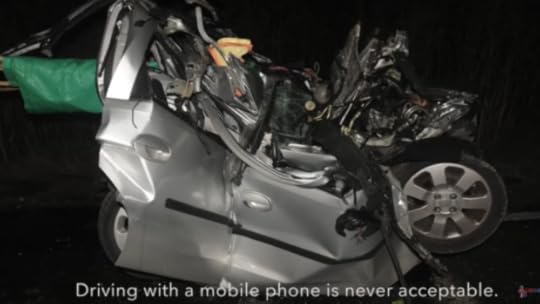
Kroker was yesterday given a ten year jail term. The judge said he might as well have had his eyes closed. Ten years doesn't seem much for four lives. Especially when you compare it to sentences handed down to those who commit serious crimes which nevertheless don't involve death and serious injury.
As I drove home from work the fog had lifted. The sun was shining. The news on the radio told of the tragedy so obvious in these stills. And yet there remained drivers passing by on the A17 studying their phones, reading maps, holding clipboards and otherwise paying no attention to the road ahead of them. I suppose I was one of them, horrified, like a rabbit caught in the headlights, unable to move, unable to believe what I was seeing.
What more needs to be said?
What more can be done?
It's heartbreaking.
Whilst aware of what was happening in front of me I could also see quite clearly what was happening in the cabs/behind the windscreens of the vehicles passing me in the opposite direction. I counted half a dozen pairs of eyes looking anywhere but the road ahead. (I suppose that makes seven, if you count mine. But I wasn't going anywhere at the time.)

Some were texting. One driver was opening a sandwich. Another looked as though he was opening a map.

This man - Tomasz Kroker - was changing the music on his mobile phone when he ploughed into the back of a stationery car on the A34 in Berkshire, earlier this year killing all the occupants - a mother and three children, returning from a camping trip to Devon.

Thames Valley Police has worked with the bereaved relatives to produce a video in an attempt to highlight the huge dangers of even a moment's distraction. These stills are taken from the video. I'm not going to show the video or even link to it, partly because it is horrific, partly because of the highly inappropriate and offensive ad for Disneyworld - of all places - that preceded it when I clicked on YouTube.

Kroker was yesterday given a ten year jail term. The judge said he might as well have had his eyes closed. Ten years doesn't seem much for four lives. Especially when you compare it to sentences handed down to those who commit serious crimes which nevertheless don't involve death and serious injury.
As I drove home from work the fog had lifted. The sun was shining. The news on the radio told of the tragedy so obvious in these stills. And yet there remained drivers passing by on the A17 studying their phones, reading maps, holding clipboards and otherwise paying no attention to the road ahead of them. I suppose I was one of them, horrified, like a rabbit caught in the headlights, unable to move, unable to believe what I was seeing.
What more needs to be said?
What more can be done?
It's heartbreaking.
Published on November 01, 2016 04:47
October 28, 2016
The Foolish King by Mark Price
We've been away for a few days, a lovely time of relaxation, reading and... reviewing. Yes, reviewing. In the case of this wonderful book by Mark Price, we found the time to film this video review, something that's been on the to-do list ever since the book arrived (and was instantly snaffled by Charlie). Seems only fair that he should review it, don't you think?
The Foolish King is the first children’s book by Mark Price and was written to teach his daughter how to play chess. There's also an interactive iPad app that's ideal for children aged six and above. Using the same story and Martin Brown’s illustrations, it features clear tutorials, tips on how to improve your technique and suggestions for chess moves to try.
The book is available on Amazon as well as good bookshops everywhere. The app can be downloaded from the iTunes store.
The Foolish King is the first children’s book by Mark Price and was written to teach his daughter how to play chess. There's also an interactive iPad app that's ideal for children aged six and above. Using the same story and Martin Brown’s illustrations, it features clear tutorials, tips on how to improve your technique and suggestions for chess moves to try.
The book is available on Amazon as well as good bookshops everywhere. The app can be downloaded from the iTunes store.
Published on October 28, 2016 06:55
October 21, 2016
Aberfan
I'm not quite old enough to remember the awful tragedy of Aberfan that occurred exactly 50 years ago today. But I vividly remember it being discussed, probably a few years later on similar anniversaries to the one being marked today.
The name Aberfan has become synomymous with the worst mining disaster in British history: a day that was the last dawn for 116 children of the local primary school and a day that destroyed the lives of hundreds, possibly thousands more affected by the tragedy.
I've been dwelling on it recently, and considering it from a parent's perspective. And what struck me most vividly was the fact that so many of the parents - father's, mainly - would have been miners. Because that was what Aberfan was - a mining village where generations of families would have been employed at the pit, in a hazardous occupation that claimed many lives but which they could never have imagined claiming the lives of their own children.
Some of the black-and-white photos of years ago show men in miners helmets helping with the rescue. What must it have been like for the men who mined the material a by-product of which was smothering and crushing their own children? How could such men return to work, knowing that what they were doing, that some of the material falling at their feet, had been the immediate cause of such catastrophe.
The men weren't to blame, of course. The National Coal Board paid expensive lawyers to try and prove that they weren't responsible, either. Very much in the tradition of the old private mine owners, that.
But grief is anything but rational, and the raw emotion and the close connection between livelihoods - life - and the senseless deaths of 116 children along with 28 adults cannot have been far from these men's thoughts. Imagine being them. Digging the graves of their own children...
Each pick, each shovel full of wet, black shards of coal,Each newly-excavated space a holeA child might fill, until the mine is full,Until the coal you dig has covered every one.
Heavy wet slag sliding like hot tar downhill.While far, far underground you dig and drillAnd dig some more. The pitiless fossilFalls to the floor, covers your boots
Like ash, blackens your face And closes you in darknessLike your daughter, her small body Now entombed in a new grave
Dug for her by her own father,By his father and his father's father.Back in time forever, to when this coalWas first discovered.
Soon the sirens will be heard.The shift will end for him, For her, forever. The cage hurries Miners back to light, to air.
Worried faces gather at the pit head.And you walk, then run and thenYou're sprinting down the hillTo where she lies with all
The others, trapped in airless darkness.No cage will ever rise, no siren soundThe end of this eternal shift of blackness:They lie frozen, like a fossil, underground.
The name Aberfan has become synomymous with the worst mining disaster in British history: a day that was the last dawn for 116 children of the local primary school and a day that destroyed the lives of hundreds, possibly thousands more affected by the tragedy.
I've been dwelling on it recently, and considering it from a parent's perspective. And what struck me most vividly was the fact that so many of the parents - father's, mainly - would have been miners. Because that was what Aberfan was - a mining village where generations of families would have been employed at the pit, in a hazardous occupation that claimed many lives but which they could never have imagined claiming the lives of their own children.
Some of the black-and-white photos of years ago show men in miners helmets helping with the rescue. What must it have been like for the men who mined the material a by-product of which was smothering and crushing their own children? How could such men return to work, knowing that what they were doing, that some of the material falling at their feet, had been the immediate cause of such catastrophe.
The men weren't to blame, of course. The National Coal Board paid expensive lawyers to try and prove that they weren't responsible, either. Very much in the tradition of the old private mine owners, that.
But grief is anything but rational, and the raw emotion and the close connection between livelihoods - life - and the senseless deaths of 116 children along with 28 adults cannot have been far from these men's thoughts. Imagine being them. Digging the graves of their own children...
Each pick, each shovel full of wet, black shards of coal,Each newly-excavated space a holeA child might fill, until the mine is full,Until the coal you dig has covered every one.
Heavy wet slag sliding like hot tar downhill.While far, far underground you dig and drillAnd dig some more. The pitiless fossilFalls to the floor, covers your boots
Like ash, blackens your face And closes you in darknessLike your daughter, her small body Now entombed in a new grave
Dug for her by her own father,By his father and his father's father.Back in time forever, to when this coalWas first discovered.
Soon the sirens will be heard.The shift will end for him, For her, forever. The cage hurries Miners back to light, to air.
Worried faces gather at the pit head.And you walk, then run and thenYou're sprinting down the hillTo where she lies with all
The others, trapped in airless darkness.No cage will ever rise, no siren soundThe end of this eternal shift of blackness:They lie frozen, like a fossil, underground.
Published on October 21, 2016 08:19
October 17, 2016
Get knotted!
I was never much of a Boy Scout. In fact, I never graduated from Cubs. Consequently I don't know the difference between a sheep shank and half-hitch and as for a fisherman's bend...
So, knots have been a knotty problem. But no longer. Thanks to getting one of these new whizzy gizmos, 'the world's ultimate rope connector' I now no longer need to worry about a bowline hitch or a double reef. As the blurb says, 'a simple twist of the wrist' is virtually all that's needed to tie and untie any rope in seconds.

And it does. I used it on a recent trip to Cambridge... to secure a bike to the roof rack. And I can confirm that in spite of a drive on some rather bumpy, twisty roads to get to the A1, then a short drive on the A1 followed by the hell that is the A14, it remained secure throughout. And untying it once we'd arrived was, as the man said, a matter of a quick twist of the wrist.
It's one of those things that's so useful, and so simple, you really do wonder why no-one ever thought of it before. But it doesn't stop there. Because from the same stable you can buy a cargo netting too, to completely secure your load or even - as I have been doing - to gather up all that autumn pruning quickly and easily.
But the chief advantage of the What Knot is safety. As the founder, Stephen Daniels, says:
On average 45 deaths a year are due to people falling from unsecured ladders. 48,000 a year end up in A&E, with a cost to the government of some £60million every year. In Australia alone, over 500 people damage or lose their eyesight each year due to accidents with bungee cords and elasticised luggage straps. That equates to tens of thousands of avoidable accidents around the world.
The What Knot is an outstanding innovation of design and I am totally committed to it. The materials used are second-to-none for its purpose. There are absolutely no other competitor products that cover such a variety of rope sizes or which match it for strength, versatility, speed, ease of use or quality.
The What Knot is available to buy for £7.95 from https://www.whatknot.co.uk/ where you can also buy ropes, nets, steel hooks and 'What Knot' bundles.

So, knots have been a knotty problem. But no longer. Thanks to getting one of these new whizzy gizmos, 'the world's ultimate rope connector' I now no longer need to worry about a bowline hitch or a double reef. As the blurb says, 'a simple twist of the wrist' is virtually all that's needed to tie and untie any rope in seconds.

And it does. I used it on a recent trip to Cambridge... to secure a bike to the roof rack. And I can confirm that in spite of a drive on some rather bumpy, twisty roads to get to the A1, then a short drive on the A1 followed by the hell that is the A14, it remained secure throughout. And untying it once we'd arrived was, as the man said, a matter of a quick twist of the wrist.
It's one of those things that's so useful, and so simple, you really do wonder why no-one ever thought of it before. But it doesn't stop there. Because from the same stable you can buy a cargo netting too, to completely secure your load or even - as I have been doing - to gather up all that autumn pruning quickly and easily.
But the chief advantage of the What Knot is safety. As the founder, Stephen Daniels, says:
On average 45 deaths a year are due to people falling from unsecured ladders. 48,000 a year end up in A&E, with a cost to the government of some £60million every year. In Australia alone, over 500 people damage or lose their eyesight each year due to accidents with bungee cords and elasticised luggage straps. That equates to tens of thousands of avoidable accidents around the world.
The What Knot is an outstanding innovation of design and I am totally committed to it. The materials used are second-to-none for its purpose. There are absolutely no other competitor products that cover such a variety of rope sizes or which match it for strength, versatility, speed, ease of use or quality.
The What Knot is available to buy for £7.95 from https://www.whatknot.co.uk/ where you can also buy ropes, nets, steel hooks and 'What Knot' bundles.

Published on October 17, 2016 02:04
October 6, 2016
Poetry puh-lease!
It's National Poetry Day and I thought I'd better contribute in some way. But rather than subject you to some of my occasional verse (and worse) I've spent the morning uploading this...
... an edition of Rural Rhymes, chosen and read by Robin Holmes, one of the lovely little BBC Radio 3 'fillers' that used to be broadcast in the odd five-or-so minutes that it took for a piano to be shifted, or for the next programme to be cued (especially if a concert finished early) or any other of the many reasons radio stations have for requiring something on stand-by.
Nowadays, of course, it's all 'trails'. Back then, it was poetry - wonderfully read and seasonally-themed... and no longer, it seems, stored in the BBC Archives. A brief exchange with Petroc Trelawny this morning seems to confirm the worst...
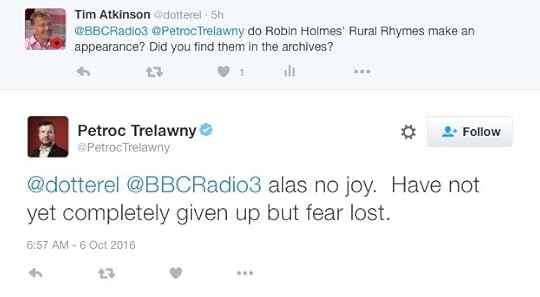
All of which means this, and the other little except I've previously posted, might be the only remaining examples of these charming little poetry programmes. Unless there are other listeners out there who, like me, once taped concerts and occasionally failed to stop the recording before committing these readings to magnetic tape. (That was how you did it in those dim and distant days!)
BBC Radio 3 is currently celebrating its 70th anniversary, and they've been mining their archive of poetry readings under the direction of the Bard of Barnsley, Ian McMillan. And today - National Poetry Day - has already seen countless examples of poets reading their work.
But there are very few who do it well. I was surprised this morning by the way the wonderful Caribbean poet James Berry introduced and read his wonderful 'White Child meets Black Man' at approx. 7.10am this morning on Radio 3 - with all the 'dum-de-dum-de-dum-de' stresses of a nursery rhyme.
And he's not alone. Betjeman was on later, reading in his arch-ironic, comic tones as if his tongue is firmly in his cheek and all this 'poh-trah' lark is just a jape.
Actors are no better, as anyone who regularly listens to BBC Radio 4's Poetry Please will know. There are exceptions, of course, among them Derek Jacobi who reads Robert Fagle's first-rate translation of The Iliad so well. And some poets do a decent job, too - none more so than Seamus Heaney... which begs the question why The Today Programme chose to broadcast the Prince of Wales reading Heaney's wonderful poem 'Shipping Forecast' earlier this morning.
But why is it so difficult to get the reading just right, even for the poet?
I suspect that $64000 dollar question may never be answered. But it begs another. Why - when someone does get is so obviously, so consistently and so memorably right - does the BBC wipe the tapes?

... an edition of Rural Rhymes, chosen and read by Robin Holmes, one of the lovely little BBC Radio 3 'fillers' that used to be broadcast in the odd five-or-so minutes that it took for a piano to be shifted, or for the next programme to be cued (especially if a concert finished early) or any other of the many reasons radio stations have for requiring something on stand-by.
Nowadays, of course, it's all 'trails'. Back then, it was poetry - wonderfully read and seasonally-themed... and no longer, it seems, stored in the BBC Archives. A brief exchange with Petroc Trelawny this morning seems to confirm the worst...

All of which means this, and the other little except I've previously posted, might be the only remaining examples of these charming little poetry programmes. Unless there are other listeners out there who, like me, once taped concerts and occasionally failed to stop the recording before committing these readings to magnetic tape. (That was how you did it in those dim and distant days!)
BBC Radio 3 is currently celebrating its 70th anniversary, and they've been mining their archive of poetry readings under the direction of the Bard of Barnsley, Ian McMillan. And today - National Poetry Day - has already seen countless examples of poets reading their work.
But there are very few who do it well. I was surprised this morning by the way the wonderful Caribbean poet James Berry introduced and read his wonderful 'White Child meets Black Man' at approx. 7.10am this morning on Radio 3 - with all the 'dum-de-dum-de-dum-de' stresses of a nursery rhyme.
And he's not alone. Betjeman was on later, reading in his arch-ironic, comic tones as if his tongue is firmly in his cheek and all this 'poh-trah' lark is just a jape.
Actors are no better, as anyone who regularly listens to BBC Radio 4's Poetry Please will know. There are exceptions, of course, among them Derek Jacobi who reads Robert Fagle's first-rate translation of The Iliad so well. And some poets do a decent job, too - none more so than Seamus Heaney... which begs the question why The Today Programme chose to broadcast the Prince of Wales reading Heaney's wonderful poem 'Shipping Forecast' earlier this morning.
But why is it so difficult to get the reading just right, even for the poet?
I suspect that $64000 dollar question may never be answered. But it begs another. Why - when someone does get is so obviously, so consistently and so memorably right - does the BBC wipe the tapes?

Published on October 06, 2016 04:15
October 3, 2016
It happened to a vet
James Herriot, doyen of (pre-Strictly) Saturday-night viewing and light, nostalgic reading, a man who could (according to one TV reviewer) strike terror into cows everywhere at the mere unbuttoning of a shirt sleeve, was born 100 years ago today.
Although the books (which I've read many, many times) are considered trifles, they're actually superbly-crafted tales, each spun (seemingly) from a real-life anecdote and populated by larger-than-life (but delicately written) characters. What's not to like?
Growing up in Yorkshire as I did, they were also great at confirming what was best about the county - not least, the wonderful scenery. As a bit of a groupie I took the trail long before Herriot-country existed and used the books as an excuse to visit some of the most beautiful landscapes - although it has to be said that the real Herriot's patch was generally east of Thirsk rather than reaching into every nook and cranny of the dales. But TV clearly decided the latter was the better backdrop. And why not?
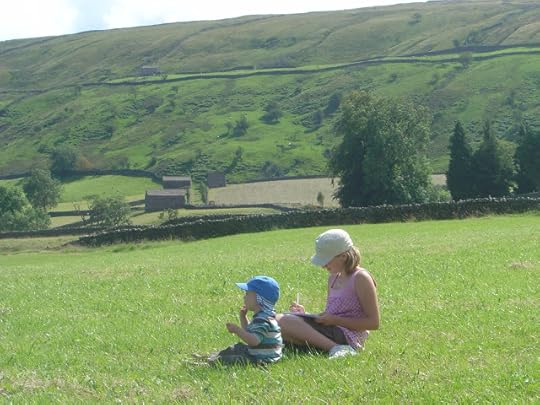
The real 'James Herriot' was a hard-working country vet by the name of Alf Wight, who had been born and brought up in Glasgow. Siegfried and Tristan Farnon were in real-life Donald and Brian Sinclair, the former of whom casts a long shadow over the story, having committed suicide not long after James' - Alf's - death some years ago.
But then, the stories always had their light and shade. There was sadness, illness, death, both human and animal and the books certainly don't shy away from the hardships of hill-farming, especially in the 1930s.
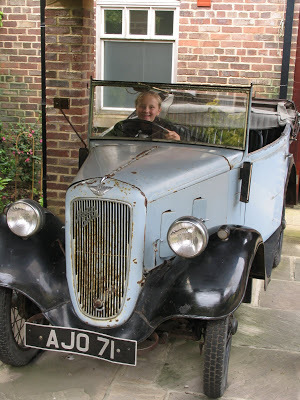
You can visit the original veterinary practice in Thirsk, sit in the car that used to splash through the stream in the TV series, even answer the famous 'Darrowby 385' telephone. But the real-life veterinary surgery - in new, purpose-built premises - thrives, and includes among its partners James' - Alf's - own son.
So the legacy lives on.
Although the books (which I've read many, many times) are considered trifles, they're actually superbly-crafted tales, each spun (seemingly) from a real-life anecdote and populated by larger-than-life (but delicately written) characters. What's not to like?
Growing up in Yorkshire as I did, they were also great at confirming what was best about the county - not least, the wonderful scenery. As a bit of a groupie I took the trail long before Herriot-country existed and used the books as an excuse to visit some of the most beautiful landscapes - although it has to be said that the real Herriot's patch was generally east of Thirsk rather than reaching into every nook and cranny of the dales. But TV clearly decided the latter was the better backdrop. And why not?

The real 'James Herriot' was a hard-working country vet by the name of Alf Wight, who had been born and brought up in Glasgow. Siegfried and Tristan Farnon were in real-life Donald and Brian Sinclair, the former of whom casts a long shadow over the story, having committed suicide not long after James' - Alf's - death some years ago.
But then, the stories always had their light and shade. There was sadness, illness, death, both human and animal and the books certainly don't shy away from the hardships of hill-farming, especially in the 1930s.

You can visit the original veterinary practice in Thirsk, sit in the car that used to splash through the stream in the TV series, even answer the famous 'Darrowby 385' telephone. But the real-life veterinary surgery - in new, purpose-built premises - thrives, and includes among its partners James' - Alf's - own son.
So the legacy lives on.
Published on October 03, 2016 00:28
September 25, 2016
My book needs you!
So, who fancies being part of something, rather than just buying something? Who would like to be a patron of the arts (*ahem*), help get something published, have a say in how the book develops, even get asked what you think of the cover design? With Unbound, you can. And I'm with Unbound.
Join me? You can, right here: https://unbound.com/books/the-glorious-dead

And my book needs your support. Not just because I want to see it published (I do). And not just because I think it's going to be good (it is) or even because the characters are fascinating (they are) and the story is compelling. Not even, if I'm honest, because the story of Britain's forgotten army - the men who stayed in France and Flanders after the Armistice, finding and burying the bodies of their fallen comrades - really needs telling.
No, ultimately the reason I'm putting this book out there with Unbound is because it makes the process of writing and producing a book much more collaborative. For instance, once the book funds and Unbound begins designing a cover, they involve the readers - those who've pledged get a say in what the book will look like! Because Unbound is about involving readers at every stage in the process. Instead of a publisher and bookseller basically deciding what people should read, Unbound is saying, 'it's your call: if you want this book you need to step forward and support it.' And, in return, you get to be part of something - something which develops its own momentum and starts to feel a bit like a campaign.
I've written (and had published) six books so far (take a look at the header!) - all reasonably successful. But this is the one I'm most excited about because for the first time I can have a conversation with the reader from the earliest stages. Subscribers to the book get to read my 'shed' posts - basically, blog posts about how it's going, what I'm doing and so on. And they can tell me what they're thinking.
So although the bottom line is that if you pledge you get your name in the lovely, hardback special edition of the book (as well as the book itself, of course!) as a supporter you get much, much more.
You get to be part of something. And among those already 'part of' this 'something' are some familiar names - from ex-Crimewatch presenter-turned-author Sue Cook, to Time Team's Robin Pryor (founder of Flag Fen), the 'Bard of Barnsley' and presenter of BBC Radio 3's 'The Verb' Ian MacMillan and former curate of Boston Stump, Saturday Live presenter and ex-pop star Richard Coles. And that's in addition to the other 250-odd people - some known personally, many more strangers who have come across the book on the Unbound website - all of whom I feel I can now count as partners in the exciting enterprise of bringing a new book into being.
Will you be joining them?
https://unbound.com/books/the-glorious-dead
Join me? You can, right here: https://unbound.com/books/the-glorious-dead

And my book needs your support. Not just because I want to see it published (I do). And not just because I think it's going to be good (it is) or even because the characters are fascinating (they are) and the story is compelling. Not even, if I'm honest, because the story of Britain's forgotten army - the men who stayed in France and Flanders after the Armistice, finding and burying the bodies of their fallen comrades - really needs telling.
No, ultimately the reason I'm putting this book out there with Unbound is because it makes the process of writing and producing a book much more collaborative. For instance, once the book funds and Unbound begins designing a cover, they involve the readers - those who've pledged get a say in what the book will look like! Because Unbound is about involving readers at every stage in the process. Instead of a publisher and bookseller basically deciding what people should read, Unbound is saying, 'it's your call: if you want this book you need to step forward and support it.' And, in return, you get to be part of something - something which develops its own momentum and starts to feel a bit like a campaign.
I've written (and had published) six books so far (take a look at the header!) - all reasonably successful. But this is the one I'm most excited about because for the first time I can have a conversation with the reader from the earliest stages. Subscribers to the book get to read my 'shed' posts - basically, blog posts about how it's going, what I'm doing and so on. And they can tell me what they're thinking.
So although the bottom line is that if you pledge you get your name in the lovely, hardback special edition of the book (as well as the book itself, of course!) as a supporter you get much, much more.
You get to be part of something. And among those already 'part of' this 'something' are some familiar names - from ex-Crimewatch presenter-turned-author Sue Cook, to Time Team's Robin Pryor (founder of Flag Fen), the 'Bard of Barnsley' and presenter of BBC Radio 3's 'The Verb' Ian MacMillan and former curate of Boston Stump, Saturday Live presenter and ex-pop star Richard Coles. And that's in addition to the other 250-odd people - some known personally, many more strangers who have come across the book on the Unbound website - all of whom I feel I can now count as partners in the exciting enterprise of bringing a new book into being.
Will you be joining them?
https://unbound.com/books/the-glorious-dead
Published on September 25, 2016 02:02
September 11, 2016
Back to school
For the first time in some years, I find myself on a Sunday evening anticipating school again on Monday morning. Yes, I'm back - for a bit. But not for long. Just a couple of days a week until May, but it's enough to bring that slight sense of foreboding as the sun sets on the weekend, as the Countryfile theme begins and as the kids get ready for bed.
Sunday nights in September always bring that strange sense of melancholy, too - summer gone, things - so many things - not done and other things no more than distant memories. No-one captured the mood better, in my view, than Edward Thomas.
Thomas was killed in action in April 1917 during the Battle of Arras. His poetry - which he had only begun to write five years earlier - was for many years regarded as typical of the English pastoral style. There's no doubt Thomas held a deep affection for the English landscape. When asked why he'd volunteered (he was almost forty when killed) and why he was fighting, he picked up a handful of soil and said 'for this'.
Gone, gone again,
May, June, July,
And August gone,
Again gone by,
Not memorable
Save that I saw them go,
As past the empty quays
The rivers flow.
And now again,
In the harvest rain,
The Blenheim oranges
Fall grubby from the trees,
As when I was young—
And when the lost one was here—
And when the war began
To turn young men to dung.
Look at the old house,
Outmoded, dignified,
Dark and untenanted,
With grass growing instead
Of the footsteps of life,
The friendliness, the strife;
In its beds have lain
Youth, love, age, and pain:
I am something like that;
Only I am not dead,
Still breathing and interested
In the house that is not dark:—
I am something like that:
Not one pane to reflect the sun,
For the schoolboys to throw at—
They have broken every one.

Sunday nights in September always bring that strange sense of melancholy, too - summer gone, things - so many things - not done and other things no more than distant memories. No-one captured the mood better, in my view, than Edward Thomas.
Thomas was killed in action in April 1917 during the Battle of Arras. His poetry - which he had only begun to write five years earlier - was for many years regarded as typical of the English pastoral style. There's no doubt Thomas held a deep affection for the English landscape. When asked why he'd volunteered (he was almost forty when killed) and why he was fighting, he picked up a handful of soil and said 'for this'.
Gone, gone again,
May, June, July,
And August gone,
Again gone by,
Not memorable
Save that I saw them go,
As past the empty quays
The rivers flow.
And now again,
In the harvest rain,
The Blenheim oranges
Fall grubby from the trees,
As when I was young—
And when the lost one was here—
And when the war began
To turn young men to dung.
Look at the old house,
Outmoded, dignified,
Dark and untenanted,
With grass growing instead
Of the footsteps of life,
The friendliness, the strife;
In its beds have lain
Youth, love, age, and pain:
I am something like that;
Only I am not dead,
Still breathing and interested
In the house that is not dark:—
I am something like that:
Not one pane to reflect the sun,
For the schoolboys to throw at—
They have broken every one.

Published on September 11, 2016 11:46
September 9, 2016
Grammar schools... love them or loathe them, they're not the answer
Back to school brings with it some familiar, depressing news...
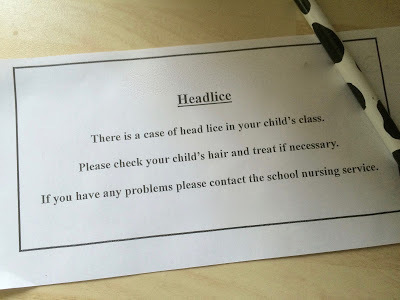
Yes, that. And in the first week back.
But there's worse. Because you can get rid of the little critters that populate primary school heads (that's the heads of primary-age children, not the Headteachers of such establishments, although for all I know...)
If only you could rid the world of politicians with such ease. Because education is once again a political battleground. The proposal to allow new grammar schools predictably divides opinion on ideological lines. In the blue corner, those who favour even more tests (the deeply flawed 11+) and a restructuring of secondary education while in the red corner, a depressing allegiance to the failed one-size-fits all philosophy of the last fifty years.
In the row over the proposal to permit more grammar schools something rather important seems to have been overlooked. Neither side in the for- and anti- debate seems to acknowledge that all children are different, learn differently, excel in different ways and make progress in often widely different rates. Or that what we know about how children - and the rest of us - learn has changed beyond all recognition in the last fifty years.
Unfortunately, the current factory model makes no allowances for the quantum leaps made in our understanding of learning. Schools, as presently structured, with teachers before (often unreasonably large) classes just don't cut the mustard with our brains, and what we know of how they work.
Now for a a bit of controversy. Selection - academic, skills-based, aptitude-determined - is a good thing. Yes. I'm a product of comprehensive education, and - as a teacher - have taught in both the selective and non-selective sectors. Tailoring what we, the schools, do to meet the needs of the individual is most definitely the way forward. Teaching them in traditional classes in the traditional way is not.
No school, as we know them, anywhere in the world is able adequately to adapt to this fundamental and urgent challenge. Technology has given us a fabulous opportunity to do something really radical with the education system. The research already exists and the methods have been tried and tested.
If only someone had the guts the put that on the political agenda.

Yes, that. And in the first week back.
But there's worse. Because you can get rid of the little critters that populate primary school heads (that's the heads of primary-age children, not the Headteachers of such establishments, although for all I know...)
If only you could rid the world of politicians with such ease. Because education is once again a political battleground. The proposal to allow new grammar schools predictably divides opinion on ideological lines. In the blue corner, those who favour even more tests (the deeply flawed 11+) and a restructuring of secondary education while in the red corner, a depressing allegiance to the failed one-size-fits all philosophy of the last fifty years.
In the row over the proposal to permit more grammar schools something rather important seems to have been overlooked. Neither side in the for- and anti- debate seems to acknowledge that all children are different, learn differently, excel in different ways and make progress in often widely different rates. Or that what we know about how children - and the rest of us - learn has changed beyond all recognition in the last fifty years.
Unfortunately, the current factory model makes no allowances for the quantum leaps made in our understanding of learning. Schools, as presently structured, with teachers before (often unreasonably large) classes just don't cut the mustard with our brains, and what we know of how they work.
Now for a a bit of controversy. Selection - academic, skills-based, aptitude-determined - is a good thing. Yes. I'm a product of comprehensive education, and - as a teacher - have taught in both the selective and non-selective sectors. Tailoring what we, the schools, do to meet the needs of the individual is most definitely the way forward. Teaching them in traditional classes in the traditional way is not.
No school, as we know them, anywhere in the world is able adequately to adapt to this fundamental and urgent challenge. Technology has given us a fabulous opportunity to do something really radical with the education system. The research already exists and the methods have been tried and tested.
If only someone had the guts the put that on the political agenda.
Published on September 09, 2016 08:55
September 5, 2016
Parental Anxiety: is it possible to get it right?
It's the start of a new school year and with it, a reminder to parents everywhere that we can't always be there for our children. And that the worry, for a parent, never stops.
Parental anxiety is one of the themes in Dr Carol Cooper's latest novel, Hampstead Fever (available in bookshops, and online from Amazon and other retailers) and I'm delighted to say that Carol has written a blog post on the subject, specially for us. She writes...
When expecting your first child, there’s a golden moment during which you’re thrilled with the prospect of having a baby, but haven’t yet realised that you’re on course for a lifetime of worry.
Not all parents are anxious about their offspring. Some are so laid back they’re in danger of falling over, but those, in my experience as a doctor and a mother, are few and far between.
There’s plenty to agonise over. My own three kids kicked off with asthma, allergies, and accidents before working their way through the rest of the medical dictionary.
While on the Bs (bronchiolitis and broken bones), one of my twins was suspected of having a brain tumour. His CT scan was under anaesthetic, and he took a scary length of time to come round afterwards. Naturally, I imagined all kinds of permanent damage. All was well, as it turned out, while I got a few more grey hairs.
Being a family doctor has been of limited use. I know from my own practice how quickly things can change with children. Usually it’s for the better, but sometimes it’s the other way.
I’m only too aware of conditions like sepsis where symptoms may be minimal in the early stages, yet can lead to death within little more than an hour. Surely it’s easier all round to remain vigilant 24/7? That way, when a new threat comes along, you’re already on high alert.
Worry becomes hard to turn off. There’s the nagging feeling that the moment you relax is when things will go wrong. So you spend the best years of your life (and theirs) fretting. You know, just in case.
I sometimes stopped worrying for a moment or two. Then I’d find one of my sons fiddling with matches. Or having duels with his best friend, armed with metal curtain poles sharpened to a terrifying point.
The bad news? There isn’t a moment at which anxieties melt away. Growing up brings new risks, like drugs, sex, and drink.
Parental worry is one of the themes in my latest novel Hampstead Fever. None of the characters gets it right, but there is an answer, of sorts.
Being anxious won’t stop bad things from happening. It’s not a talisman like a four-leaf clover or a lucky rabbit’s foot. It’s more like being the rabbit, without its paw.
The best any parent can do is to get up to speed with the facts. Share the information with your children, in an age-appropriate way, and take common sense precautions. Then enjoy the magical experience of raising a child, and worry only when you have to.
***
There are many places to find reliable health info, including NHS Choices and Patient UK.

Carol Cooper is a GP, journalist, and author. After a string of parenting books and an award-winning textbook of general practice, she turned her hand to contemporary fiction with a medical hint. She teaches medical students at Imperial College, London, and is president of the Guild of Health Writers. Best of all, she has three amazing sons.
Parental anxiety is one of the themes in Dr Carol Cooper's latest novel, Hampstead Fever (available in bookshops, and online from Amazon and other retailers) and I'm delighted to say that Carol has written a blog post on the subject, specially for us. She writes...
When expecting your first child, there’s a golden moment during which you’re thrilled with the prospect of having a baby, but haven’t yet realised that you’re on course for a lifetime of worry.
Not all parents are anxious about their offspring. Some are so laid back they’re in danger of falling over, but those, in my experience as a doctor and a mother, are few and far between.
There’s plenty to agonise over. My own three kids kicked off with asthma, allergies, and accidents before working their way through the rest of the medical dictionary.
While on the Bs (bronchiolitis and broken bones), one of my twins was suspected of having a brain tumour. His CT scan was under anaesthetic, and he took a scary length of time to come round afterwards. Naturally, I imagined all kinds of permanent damage. All was well, as it turned out, while I got a few more grey hairs.
Being a family doctor has been of limited use. I know from my own practice how quickly things can change with children. Usually it’s for the better, but sometimes it’s the other way.
I’m only too aware of conditions like sepsis where symptoms may be minimal in the early stages, yet can lead to death within little more than an hour. Surely it’s easier all round to remain vigilant 24/7? That way, when a new threat comes along, you’re already on high alert.
Worry becomes hard to turn off. There’s the nagging feeling that the moment you relax is when things will go wrong. So you spend the best years of your life (and theirs) fretting. You know, just in case.
I sometimes stopped worrying for a moment or two. Then I’d find one of my sons fiddling with matches. Or having duels with his best friend, armed with metal curtain poles sharpened to a terrifying point.
The bad news? There isn’t a moment at which anxieties melt away. Growing up brings new risks, like drugs, sex, and drink.
Parental worry is one of the themes in my latest novel Hampstead Fever. None of the characters gets it right, but there is an answer, of sorts.
Being anxious won’t stop bad things from happening. It’s not a talisman like a four-leaf clover or a lucky rabbit’s foot. It’s more like being the rabbit, without its paw.
The best any parent can do is to get up to speed with the facts. Share the information with your children, in an age-appropriate way, and take common sense precautions. Then enjoy the magical experience of raising a child, and worry only when you have to.
***
There are many places to find reliable health info, including NHS Choices and Patient UK.

Carol Cooper is a GP, journalist, and author. After a string of parenting books and an award-winning textbook of general practice, she turned her hand to contemporary fiction with a medical hint. She teaches medical students at Imperial College, London, and is president of the Guild of Health Writers. Best of all, she has three amazing sons.
Published on September 05, 2016 02:19



